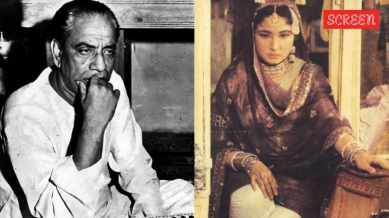Click here to follow Screen Digital on YouTube and stay updated with the latest from the world of cinema.

Perhaps one of the most talented film music composers in post-Independence India, Ghulam Mohamed gave music to films such as Pakeezah and Mirza Ghalib. While the songs live on, the composer himself has been lost from memory, with his life marked by struggle and penury, never to enjoy the fruits of his success as he passed away years before Kamal Amrohi’s magnum opus released, struggling for food and medicines.
Ghulam Mohammed was born in Naal village in Bikaner in 1905. His father, Nabi Baksh, was a noted tabla player, and Ghulam received his initial training in music from him. Under his father’s guidance, he became an accomplished player of traditional instruments like the dholak, tabla, and pakhawaj. He would often travel while playing music and once in the princely state of Junagadh, a minister was so impressed by his performance that he presented him with a gilded sword.
After stepping out on his own, Ghulam Mohammed went on to compose for several films, including the Madhubala-starrer Pardes, where Lata Mangeshkar lent her voice to his melodious tracks such as “Jiya Laage Nahin Mora” and “Raat Hai Taaron Bhari.” His later works included Ajeeb Ladki (1952), Amber (1952), and Dil-E-Nadaan (1953). Despite his musical talent and critically appreciated compositions, mainstream success continued to elude him, and he struggled with financial hardships throughout much of his career.
Ghulam Mohammed achieved national recognition when he won the National Film Award for Best Music Direction for Mirza Ghalib (1954), a film based on the life of the renowned Urdu poet. His soulful compositions in the film, including timeless ghazals like “Dil-E-Nadan Tujhe,” “Phir Mujhe Deeda-E-Tar,” and “Aah Ko Chahiye Ek Umar,” became immensely popular. The film was even screened at Rashtrapati Bhavan, and then–Prime Minister Jawaharlal Nehru personally praised its music, calling it a fitting tribute to the legendary poet.
Despite the national recognition, Ghulam’s career did not flourish as expected. By 1956, work opportunities had nearly dried up, and he managed to compose music for only one film over the next several years. His fortunes changed when filmmaker Kamal Amrohi approached him in 1962 to compose music for Pakeezah. Ghulam poured his heart and soul into the project, creating numerous songs—so many that Amrohi eventually had to remove three tracks from the final cut of the film.
However, Pakeezah’s release was delayed for years due to personal and professional differences between Kamal Amrohi and Meena Kumari. During this period, Ghulam Mohammed’s health deteriorated, and he tragically passed away in 1968, years before Pakeezah finally released in 1972. After his death, when Amrohi needed someone to complete the film’s background score, Ghulam’s old friend and mentor Naushad stepped in to finish the work.
Pakeezah went on to become a musical masterpiece, with its immortal songs such as “Inhin Logon Ne,” “Thade Rahiyo,” “Chalte Chalte,” “Mausam Hai Aashiqana,” “Teer-E-Nazar,” and “Najariya Ki Maari.” These tracks remain some of the most beloved compositions in the history of Indian cinema.
In a powerful gesture of respect, actor Pran refused to accept his Filmfare Award for Best Supporting Actor for Be-Imaan in 1972. He felt that music composer Ghulam Mohammed had been unjustly overlooked for his extraordinary work in Pakeezah. The Best Music Director award that year went to Shankar–Jaikishan for Be-Imaan, but Pran publicly stated that the honor rightfully belonged to the late Ghulam Mohammed.
Click here to follow Screen Digital on YouTube and stay updated with the latest from the world of cinema.